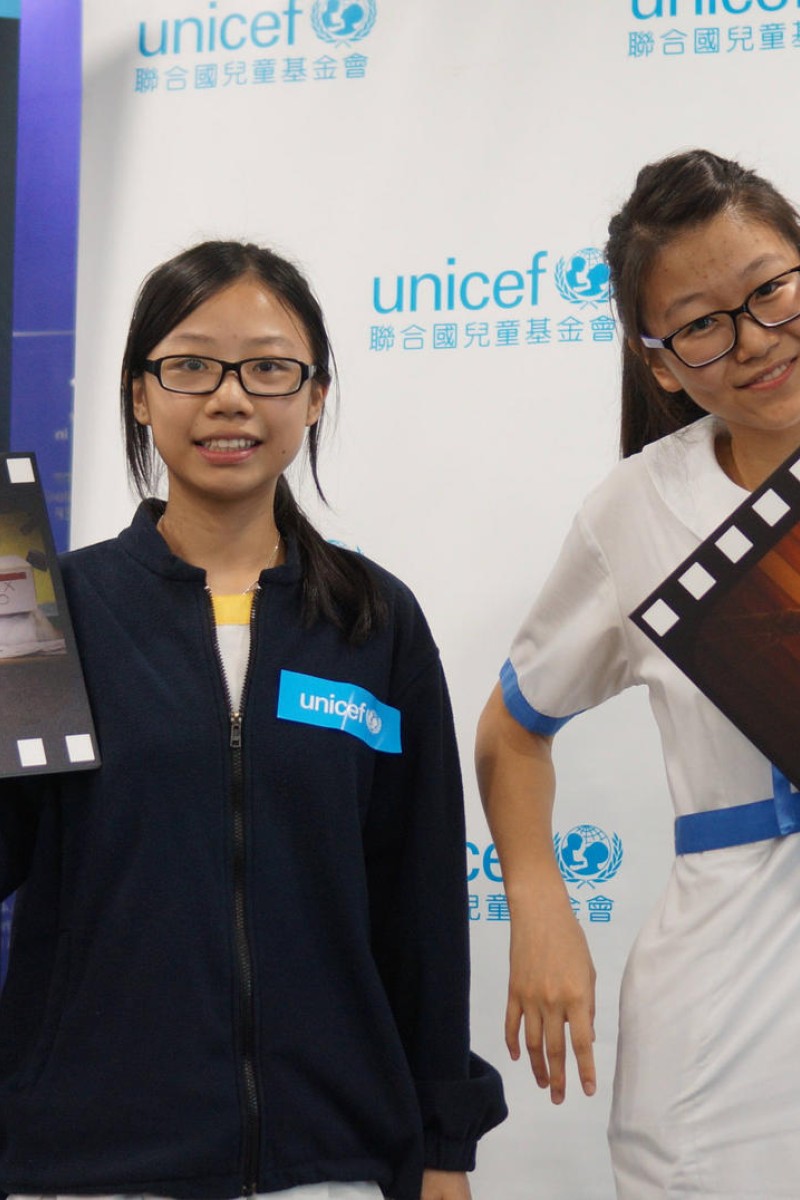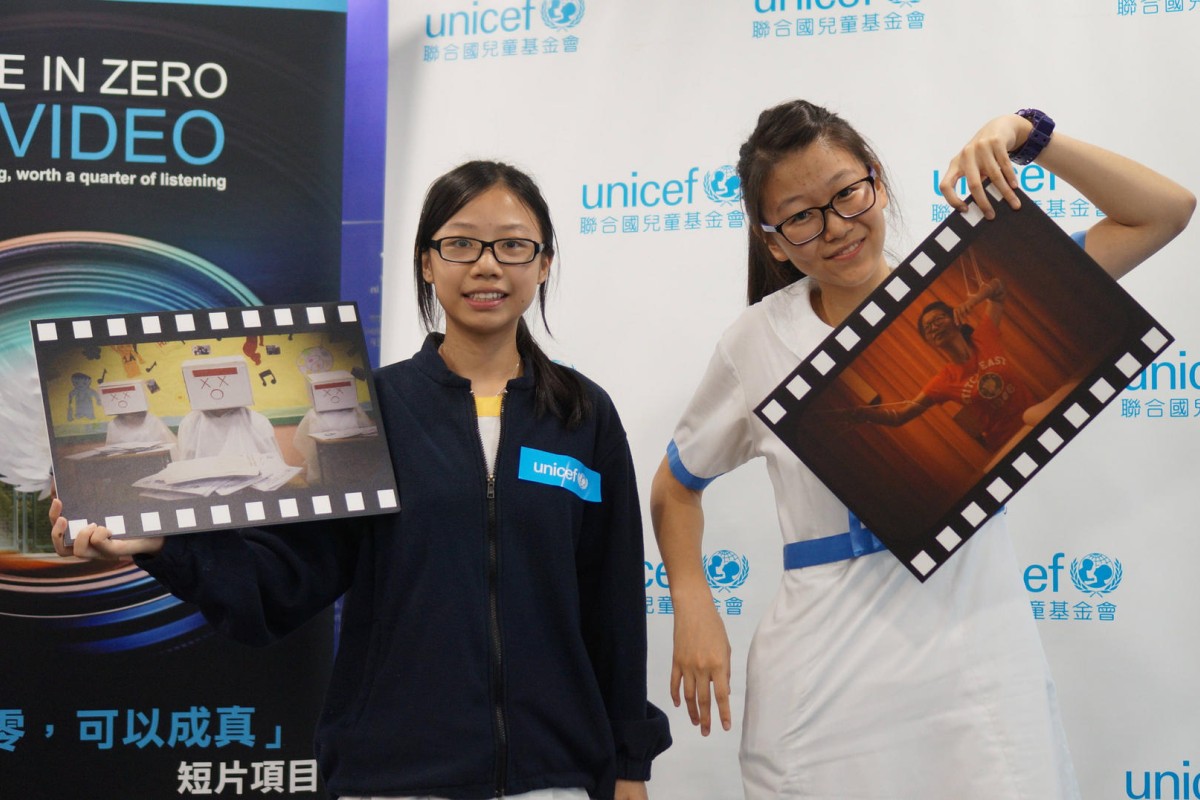
Miumiu Ng and Tse Hiu-lam are going to Amsterdam to receive awards for their videos that focus on ending child suffering
 Tse Hiu-lam (left) and Miumiu Ng show stills from their videos.
Tse Hiu-lam (left) and Miumiu Ng show stills from their videos.Today is Universal Children's Day. The Convention of the Rights of the Child was adopted by the United Nations 26 years ago, and says - among other things - that children have the right to health, education, play, family life, and to have their views heard.
But that is all on paper. Children around the world are still suffering from war, violence, discrimination, poverty and other problems. Here in Hong Kong, students face immense pressure from their schools and families.
"I've tried telling my mum that I want to study art instead of chemistry, but she thinks I'm just making excuses," says Miumiu Ng Miu-ling, a Form Five student at NLSI Lui Kwok Pat Fong College. "She's like, 'You know that I love you, why can't you appreciate it?' I do understand she loves me, so I do what she tells me. But it's binding me. I have my own dreams. And even if I fail, I want to experience that. It's my life."
Along with 59 other Hongkongers aged 12 to 18, Miumiu took part in Unicef's "Believe in Zero, Make a Video" programme. The participants attended five-day camps to brainstorm ideas, film, and edit videos with the aim of helping to end child suffering.
"After making my video with Unicef, I helped out at our campus TV station. Sometimes I would be editing until really late, and my parents would threaten to complain to the school. So I had to stop," shrugs Miumiu.
A cheerful girl who loves art and photography, Miumiu hoped she'd be allowed to study art because of her amazing results in the subject. But her mother made her take science, even though Miumiu's teachers said she wasn't suited for it, because she thought science students have better futures.
Titled Puppet Girl, Miumiu's video expresses her frustration about her parents' interference in her life. Miumiu, who acts in the video, nods obediently when ordered to throw away a wrist-band, fix her hair or give up drawing. Each time she does so, a string is tied to her arm, until she becomes a marionette and collapses.
Puppet Girl is one of 15 videos selected from 300 submissions worldwide for Unicef's The One Minutes Junior Awards. Miumiu is headed to Amsterdam, in the Netherlands, for the award ceremony on November 28. Her video will be shown alongside other nominated films in museums and art institutions around the world, and she'll also attend a masterclass with children from across the globe.
Even after finding out about her nomination, Miumiu was still shy to show the video to her mother. "But I really wanted to, so I did," she says. "She was quite impressed. I think she's beginning to realise that I can actually have accomplishments through art. Before joining this programme, I didn't have any goals in life. Now that I've set my sights on pursuing video-making, they can see how motivated I've become."
Joining Miumiu in Amsterdam is Tse Hiu-lam, a Form Six student whose video Mechanical Life was also nominated. Hiu-lam says she has been stressed out by school since Primary Five, when she had to do more than 10 homework assignments every day.
"It was impossible to finish it, so I would be doing my homework during recess or between periods," she recalls. Her parents were supportive, but there was nothing they could do to change the education system. "All they could do was stay up late with me and keep me company as I finished my assignments."
Also an art lover, Hiu-lam picked the subject for her DSE because she thought it would be more relaxing, and offer her some breathing space between studying more academic subjects. But the workload of the school-based assessment was so heavy that she needed to stay at school until very late, and her accounting grades suffered as a result.
In Form Five, she decided to give up art and focus her efforts on accounting. The decision made her realise she could make her own choices instead of following a system that only stressed her out. "All my friends are like robots. It's hard to ask them out because their schedules are filled with tutoring classes," says Hiu-lam.
Miumiu agrees. "I don't get why films like Our Times are so popular. Having a romantic relationship in school? We don't have time for that," she says.
Hiu-lam is annoyed that the DSE syllabus isn't more practical. "Some things just aren't relevant to our daily lives. Why would I ever have to read classical Chinese, or calculate the probability of winning the Mark Six?"
Despite their complaints, both girls know they are very blessed compared to children living in other parts of the world.
"I've seen the videos made by other children, and I felt a bit guilty afterwards. Some live in war-torn countries, and face death every day. I can't imagine how they cope, and still be able to live happily," says Miumiu.
"I can't wait to learn more about their situation, and share their message with Hongkongers."
Go to Unicef to see the nominated videos.